Climate Change Anomalies and IPCC Discrepancies Speculations by Stefan Stenudd
But their own graphs seem to contradict it. Have a look at this one, which is from the latest IPCC report (2014) [IPCC source, p. 3]:
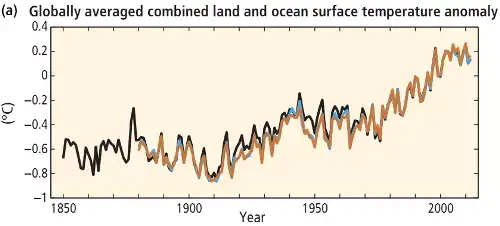
The century ends with a higher temperature than at its start, but there are very long periods halting or reversing this process. Now, have a look at the IPCC graph showing the increase of CO2 for the same period as the above graph covers (from the same source):
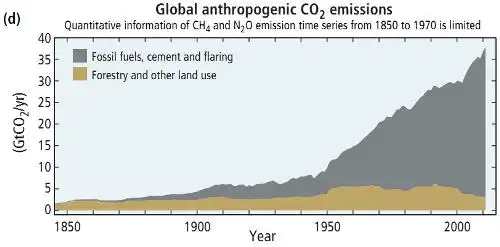
But that CO2 increase did not affect the world mean temperature at all for a number of years, as can be seen in the previous graph. Not until the late 1970s did the temperature actually rise – and then it halted in 1998 for another bunch of years that we are yet to see the end of, in spite of the continued quick increase of CO2. If the halt in temperature rise had been the case only for the first few decades of sharply increased CO2, it would be reasonable to assume that the climate effect was sort of delayed. But when a long period without temperature increase came also by the end of the century, the argument of a delay fails to explain it. It seems safe to say, as the second graph shows, that not until around 1950 was the CO2 increase big enough to be expected to have a significant effect on the climate. That's 62 of the years covered by the graphs. In these 62 years, there has only been an increase of temperature during circa 20 years. For the remaining two thirds of the period, the temperature has halted or even declined.
Explanations NeededOf course, there are theories to explain this discrepancy between increased CO2 and expected temperature rise. One is that the climate varies so much that a tendency is not evident from what happens during only a few years.This is the argument the IPCC uses (on pages 2 and 4 of the same document) when briefly mentioning the temperature anomaly:
Anyway, the “natural variability” can be said about the years when the temperature rose as well as the years it did not. It proves nothing. Also, when the periods of no temperature rise are so long – and totally 2/3 of the most significant period starting in 1950 – then the burden of proof really lies on the shorter time span. The reasonable thing to assume is that a tendency in the climate is revealed by the majority of years and not the minority of them. This suggests that something may be wrong with the idea of CO2 directly leading to temperature rise. It has also been suggested that the lack of temperature rise is caused by the oceans sort of consuming the added heat for the time being. I definitely don't have the knowledge to discuss the validity of that theory, but again it cannot explain that the temperature sometimes rises and sometimes not. If the oceans work as sort of a temporary balancing factor, then wouldn't they do that constantly, without this variation? So, from just these two graphs of IPCC:s own production, it would be bad science not to search for another relation between CO2 and world temperature than that the increase of the former automatically leads to the increase of the latter. Again, I am really no expert, but the world is one of great complexity. One thing leads to another, which in turn leads to something else, and so on. No event is isolated from the whole, and the whole is a lot of things continuously interacting. For example, CO2 is historically regarded as the gas of life, because it is essential to the growth of plants. They in turn produce oxygen, O2. The carbon, then, is bound by the plants, much like it has been bound by fossils through the history of life on earth. When CO2 increases, would that not be partly countered by an increase of plant growth? I don't know, I just put it out there. Another thing is that CO2 increases the world temperature by creating sort of a shield for heat radiation so that it does not leak out from earth. But it does the same thing in the other direction, shielding off heat radiation from the sun. Could this explain why the temperature is not galloping upwards as expected by the IPCC? [Edit August 12 2018: There is no equal reflection of radiation to and from earth. The heat from the sun and that from the earth have different wavelengths (frequencies). CO2 and even more so H2O clouds absorb the wavelengths from earth, but those from the sun go right through. Ergo the name "greenhouse effect," since greenhouses work similarly. Source here.] Surely, the scientists working with this must have answers to the above questions, but they must also admit that the two graphs really call for such answers. Otherwise, the whole premise of the IPCC warnings may be mistaken.
Stumbling PredictionsScience is all about prediction. A theory is pure speculation until it can be used to predict an outcome correctly. And if the prediction fails, the theory is probably false.The IPCC makes predictions. That's the whole point of their claim. Their main prediction is that the temperature will increase in the future, as shown in this graph (from the same source, p. 11):
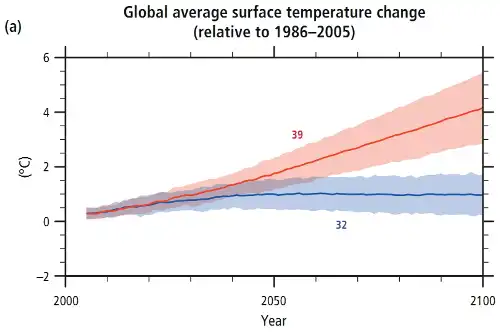
The flawed prediction is much more obvious in previous reports of the IPCC. Its third report from 2001 (before the present period of halted temperature was evident), shows this graph [IPCC source, p. 34]:
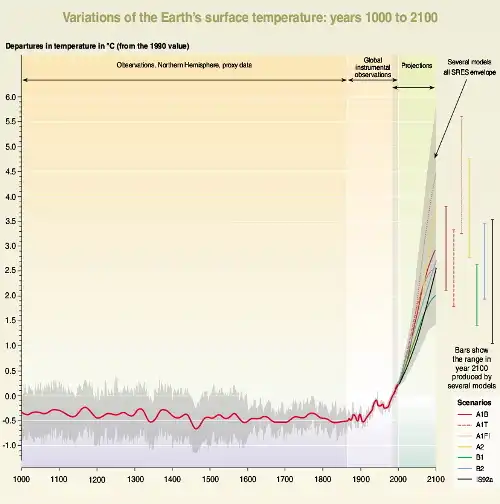
This simply means that the IPCC predictions on temperature rise still lack confirmation. They may be right or wrong about it in the long run – but that remains to be proven by actual observation.
The UrgencyOf course, the problem with waiting until the IPCC predictions have proven to be correct is that by then, the crisis is upon us. It's only by acting before the prediction becomes a reality that we can avoid the latter.Since the consequences may be very dire, doing nothing is out of the question. But that does not mean we cannot question the research and the predictions it presents. That must be an ongoing process, because questioning is how science progresses towards certainty. Furthermore, the actions needed to avoid what the IPCC predicts are not for free. They are very costly indeed, especially to those parts of the world with the least resources to handle them. So, it is a question of priorities. The so-called climate crisis is indeed a major threat to the world, should it be as suggested by the IPCC. Then, it is worth great sacrifices to be avoided. It is even worth doing right now, instead of waiting for confirmations of the IPCC predictions, although they seem to be flawed. On the other hand, if unbiased research shows that there is no climate crisis, or it is not that much of a crisis – then costly efforts to avoid it must be stopped, in order to spend our resources on other problems of a graver nature. Therefore, we must continue to allow the research and it must be unbiased. The IPCC, though, is unable to be unbiased about this issue, and not only because they have so many times forcefully committed to their claims. It is also a result of why and how this organization was formed, as well as how it operates. Instead of being a safeguard for unbiased research, the IPCC is an obstacle to it. This is what I discuss below.
Another ArmageddonThe IPCC reports and claims have been questioned at numerous occasions, also by a lot of scientists. But the sheer volume of the IPCC reports and the vast research they summarize have convinced most scientists, as well as governments and media. The world tackles the problem of reducing CO2 levels in the firm belief that it is necessary in order to avoid global catastrophe.I am always suspicious of Armageddon scenarios. They have a tendency to appear over and over, creating periods of social panic. There are countless examples of it in history. I've even seen several in my short lifetime. So, when the talk of an imminent climate crisis began – with Al Gore in the lead – I was not convinced. Gore and company were even giving the impression that it was already too late, that doom was upon us. Polar bears and ice would disappear any minute, temperatures would go wild, and so on. Still, the climate was behaving just as usual.
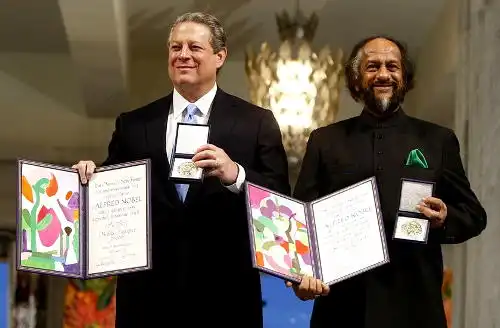 Al Gore and Rajendra K. Pachauri (Chairman of the IPCC) receive the Nobel Peace Prize in Oslo, 2007.
There was at that time a rapidly increasing media hype, with big headlines about disaster around the corner. The world was very soon going mad, they claimed. Yet, the climate was the same.
Critics Dismissed Ad HominemStill, the IPCC statements and predictions were soon regarded as established scientific facts, and anyone objecting to their findings was labeled a “denier” as if it were a religious thing – even if the critic was a merited scientist in the field. They were on a regular basis described as bought by the petroleum industry.Dismissing someone's arguments on basis of the person's character or credentials is ad hominem, and simply not valid. Arguments should be tried as such, whoever utters them. But over the last few years that seems to happen less and less. They are mostly just met with the general claim that a vast majority of scientists support the IPCC findings, and that's it. As if scientific fact is the result of a vote. What is the most absurd is that all the IPCC claims should be accepted as a whole – every statement, every figure, every conclusion – or you are regarded as a superstitious fool. Scientists objecting to just one of the IPCC claims, no matter how peripheral, are immediately dismissed, even ridiculed. But science can only advance if constantly questioned and tested. Otherwise it has become a doctrine, be it political or religious.
Centralized ResearchThe IPCC is an unusual research facility. Normally, research is done in countless different labs and institutes independent of one another. Their results are compared and examined by countless mutually independent scientists, all over the world. No one single entity decides what shall be tested or how the tests should be evaluated. It is a dynamic collective process without a leader.But the IPCC is a centralized entity choosing what research to evaluate, how to do that, and what to conclude from it. That's already in its name: Intergovernmental Panel on Climate Change. So, it is supervised by governments in a joint body, and it is to explore climate change and its consequences. Not only that. Already at its formation, the IPCC was committed to a certain finding. Its job is to find that human caused increase of greenhouse gases in our atmosphere leads to a drastic climate change that will soon create great problems in our world. So, it can come as no surprise that this is what the IPCC finds, again and again.
Purpose of the IPCCThe IPCC was founded in 1988 by two UN organizations: the United Nations Environment Programme (UNEP) and the World Meteorological Organization (WMO). It was endorsed by the UN General Assembly in December 1988.The UNEP writes in its decision about forming the IPCC: “a global climate change will result form increases in the concentration of greenhouse gases from human activities” [IPCC source] So, it has already made its mind up before the IPCC research is even started. The WMO, which must be regarded as having closer knowledge of the issue, is not that bold in its resolution from 1988 about establishing the IPCC. They say nothing about human causes, nor do they say that the climate change is confirmed. They speak about “possible climate change” [IPCC source] and the need of further research regarding causes of climate change. They state that the IPCC should aim at “assessing the scientific information that is related to the various components of the climate change issue such as emissions of major greenhouse gases and modifications of the Earth's radiation balance resulting therefrom.” That's a commendably scientific attitude shown by the WMO, by not foregoing the research needed. The General Assembly of the UN, on the other hand, had no such modesty when deciding to endorse the IPCC. They state that “certain human activities could change global climate patterns” and that “emerging evidence indicates that continued growth in atmospheric concentrations of 'greenhouse' gases could produce global warming with an eventual rise in sea levels, the effects of which could be disastrous for mankind if timely steps are not taken at all levels.” [IPCC source, p. 133.] They also state that the IPCC is to “provide internationally coordinated scientific assessments of the magnitude, timing and potential environmental and socio-economic impact of climate change.” (p. 134) And they urge governments and other entities “to treat climate change as a priority issue.” (p. 134) The whole resolution has an air of imminent disaster. So, the UN General Assembly joined hands with its Environment Programme in predicting the outcome of the research the IPCC was to administer. Thereby, the hands of the IPCC were pretty much tied to begin with. In other words, the reason for the establishment and intergovernmental support of the IPCC is the plausibility of drastic climate change caused by human activity. That is what the IPCC is expected to find. If findings would contradict this, the reason for the existence of the IPCC would disappear and the organization would soon cease to exist. That's pretty much exactly how not to guarantee unbiased and trustworthy research.
Monopoly on Climate Change FindingsOn its website, the IPCC calls itself “the leading international body for the assessment of climate change.” [IPCC source] Although it sounds bold, that's an understatement. When this colossus was created, it became the very spider's web of climate research, to the point of monopolizing it.Not that it has monopoly on the research made, since it does not even do any research of its own. But its strong international presence makes it the one entity deciding what research should be noticed and what to conclude from it. In the world of science, this is as rare as it is absurd. This entity is ruled by government representatives from the 195 member countries, mainly by decisions made at the annual plenary sessions but also in the review process of the IPCC reports. The IPCC is not modest about its own value: “Because of its scientific and intergovernmental nature, the IPCC embodies a unique opportunity to provide rigorous and balanced scientific information to decision makers. By endorsing the IPCC reports, governments acknowledge the authority of their scientific content.” [IPCC source] What it means is really that government representatives have the final say on if the findings of the IPCC are to be trusted scientifically. That's not what governments normally are burdened with, since they simply are not the most qualified to do so. What do politicians know about analyzing and verifying scientific research? They are not even the most fit to decide who to represent them in a panel occupied with scientific matters. The process by which the IPCC works is to gather research from a great number of scientists, produce reports based on that research, administer a reviewing process of those reports, and then publish them. The final stage is to present the report to a plenary session for approval. As far as I can see, the IPCC decides what research to consider, what to conclude about it and who to write the report, how to have it reviewed and by whom, as well as how the reviews should influence the final report. The IPCC is the sole manager of the whole process. [IPCC source]
A Mega Meta-StudyThe IPCC utilizes a great number of experts in the production of a report: “More than 830 Authors and Review Editors from over 80 countries were selected to form the Author teams that produced the Fifth Assessment Report (AR5). They in turn drew on the work of over 1,000 Contributing Authors and about 2,000 expert reviewers who provided over 140,000 review comments.” [IPCC source]That is quite impressive, but it also means a mass of contributions very difficult to penetrate if one is to investigate how soundly the IPCC has reached its findings. How to find consensus of any kind in this big apparatus? So, necessarily it all boils down to an editing process where a few are involved in the last steps. No matter how many expert opinions were involved, the opinions of the final editors are decisive on the result. What the IPCC produces can be described as what modern science calls a meta-study or meta-analysis, which compares a number of studies on a subject and makes conclusions about the issue that have the potential of being more trustworthy than any single one of the studies included.
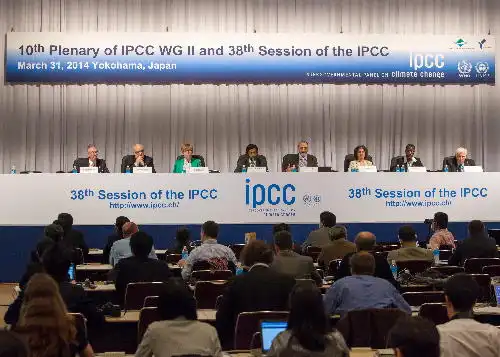 An IPCC plenary session in 2014.
There is no consensus among scientists that one meta-study suffices, just because it is big. Probably, it would be easier to find consensus for the opposite view. It's the ongoing dynamics of studies and meta-studies that gradually leads closer to what the experts can agree upon – until new studies that contradict the findings appear. Several meta-studies keep the ball rolling. If there is only one study supposed to say it all, the scientific process is halted. So, the IPCC idea of creating sort of a mega meta-study, the once and for all kind of report, is in itself counter-productive from a scientific standpoint. If anything, it is simply megalomania.
Selection of Actual ResearchThe substantial work on the reports is made by their appointed authors, who have the liberty to form their texts according to their own opinions and to pick the research they use. There is a system of reviews to broaden the perspective, but the bottom line is that the authors write the reports pretty much as they see fit.Since the IPCC does not do any actual research, the reports depend very much on what research is used to validate its findings. And that seems to be very much in the hands of the authors. The IPCC principles state: “Experts who wish to contribute material for consideration in the first draft should submit it directly to the Lead Authors.” [IPCC source, 4.2.3] That clearly means the authors decide what research to use, either by finding it themselves or by choosing to use material sent to them. This is a very fragile process. The authors are likely to choose the research that supports their own thoughts on the subject and to avoid research contradicting them. There should be some process by which all solid research regarding the claims of the IPCC is presented and included in the report – not just that which the authors wish to select. Of course, that can prove unreachable, considering the enormous quantity of research on climate these days. But the weakness of this dealing with the actual research material should be seriously considered.
All the ReviewsThe best way to judge the process towards the final IPCC reports would be to examine the reviews gathered and how they were allowed to influence the reports. But that is a gargantuan task.The results of the review processes are transparent, in accordance with the IPCC principles. All the reviews of the reports “will be retained in an open archive in a location determined by the IPCC Secretariat on completion of the Report for a period of at least five years.” [IPCC source, 4.1] They can be found on the IPCC website [click one of the reports here: IPCC source, then Drafts & Review Materials], but they are certainly a handful. The review comments are collected as short quotes, paired with the review editor comments, in tables that are hundreds of pages for each section of the report text. Trying a certain statement of the final report against review comments on it is not an easy task. What is evident from random reading in these PDF documents, though, is that each comment is considered. And if it is rejected, a short explanation is given. But the review editors are not the authors of the final reports, so their suggestions are not necessarily accepted. The review editors have made their own comments on the final version of the report, which is interesting reading. Here is the document regarding one of the chapters: [IPCC source] One problem with the reviewing process is that it does not seem to accept new or alternative research to be introduced. The reviewing process regards only existing texts and research material they refer to. So, the final version of the IPCC report shows very little of disagreement within the scientific field, although many of the review comments reveal that it exists in abundance. That is not in line with one of the IPCC principles: “In preparing the first draft, and at subsequent stages of revision after review, Lead Authors should clearly identify disparate views for which there is significant scientific or technical support, together with the relevant arguments.” [IPCC source, 4.2.3] The IPCC principles also state: “Although responsibility for the final text remains with the Lead Authors, Review Editors will need to ensure that where significant differences of opinion on scientific issues remain, such differences are described in an annex to the Report.” [IPCC source, 5.] As far as I can see, that does not really seem to be happening. It is evident from the review comments that differences of opinion exist on some of the scientific issues, so why no annex to describe them?
Unpaid ContributorsThe authors and editors selected by the IPCC to work on the reports are voluntary and unpaid. That seems at first to be very sympathetic, but it also has some other implications.Firstly, I wonder why an intergovernmental organization with the support of the UN and 195 member nations should expect people to work for free, just because they happen to be experts on the issue at hand. They are not the ones who caused the problem to begin with. A lot of work is involved in producing the reports, demanding countless hours from the contributors. That is more than what can be asked of them. For something supposed to be of such vast socio-economic importance there must be money set aside to pay for those who participate with this tremendous work in searching for the solutions. There is another problem, which regards the credibility of the reports. People who volunteer to this extent without getting compensated are certain to cherish the IPCC commitment to begin with. That is, they are very likely to agree with the conclusions already expressed at the formation of the IPCC. Those who disagree or have doubts about the way the process is carried out are not likely to be invited, nor are they likely to accept so much uncompensated work. They lack the calling, so to speak. Therefore, this system of volunteers unavoidably leads to a group of contributors already convinced of the basic IPCC claims about climate change and its human causes. A third problem with using unpaid volunteers is that limited demands can be put on them as to how they proceed with their work and how much time they spend on it. Facing this workload, they would tend to hurry to accept arguments for the paradigm on which the IPCC is constructed and hurry to reject arguments to the contrary. That is also what would lead to less reactions from others involved in the project, for the same reason. So, it is kind of a vicious circle, leading to less and less criticism of what fits the IPCC agenda, and more and more reluctance to seriously consider anything that may challenge it. The paradigm is defended and the anomalies are ignored. This mechanism of conservatism exists more or less in any field of research with a history and institutions established for it. It is a human factor. Scientists are unwilling to reconsider what they have spent years learning and teaching, professors are reluctant to be corrected by their students, and so on. Although we live in a world that is constantly changing, which certainly goes for science as well, we resist change as soon as it is inconvenient to us. And it often is.
Summary for Policy MakersThe IPCC presents several versions of its report. The most voluminous and complete ones are divided into themes assigned different work groups and presented in separate publications, containing their unabbreviated work. That's where the research behind the scientific claims is included, and much more. They can be found here: [IPCC source]That's quite a lot. For example, the first volume, presenting the physical science basis, is a PDF of 375 MB and 1,552 pages in its entirety. [IPCC source] I doubt that anyone but an expert in the field would be able to penetrate that work, which is very impressive in the richness of its content. A much more accessible version is the Synthesis Report, which is abbreviated from the biggies mentioned above, concentrating on presenting the major findings and some of the evidence for them. This version is a modest 167 pages and should suffice for anyone but an expert: [IPCC source]
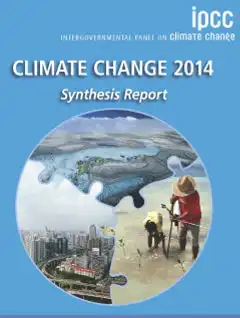 The IPCC 2014 synthesis report.
It is commendable to boil down a report as much as possible, when it is deemed necessary to have it read and understood by those in power to do something about the problem presented. Wasn't there a US president who refused to read any report longer than one sheet of paper? He might have been lazy, but also quite wise. What can't be expressed on one sheet of paper is usually not explained that very well on many more. Such editing is hard work, but usually worth it – also for the ones doing it. They sharpen their claims and arguments in the process. When the IPCC landed on 32 pages instead of just one, it may have something to do with the great volume of work they had assembled. Writers know the importance of killing one's darlings in the writing process, but scientists may have a harder time with that if the work they put into it was as time-consuming as that of the IPCC. Apart from that, there is something presumptuous about the ambition of writing what looks like a manual for the elected governments of the member nations. As if science should be the true ruler of the world. But it is not and it should not be. When it comes to decision making and its consequences, the scientific community is not better equipped than the democratic procedures. Science makes mistakes as we all do, and absolute consensus within each field is rare – especially regarding solutions. Also, science rarely has the whole picture, even if several scientific disciplines are involved. In the IPCC:s defense, the Summary for Policymakers is focused on presenting the problems and predicting the development in different scenarios, and not so much on what should be done exactly – although there is some of that, too. Even if the IPCC doesn't precisely give orders to the politicians, the claims made in their reports are so alarming that it doesn't leave much room for them. The “policymakers” are more or less told that they have to do this and that very quickly, or there will be a world catastrophe.
ErgoSo, what is it that the IPCC claims? What can be expected, considering the above about the IPCC's formation and modus operandi, are warnings of an imminent climate change with catastrophic results, due to increased human caused global warming.Sure enough. That's the bottom line of the whole report and the Summary for Policymakers. That is also the part of the content that scares governments the most – as it does the populations of their countries. Imminent doom. Of course it can happen that a scientific finding is what was expected beforehand. But the credibility in that case is nowhere near what it would be if the finding had been the reversed. Then it would be obvious that the result was independent of preconceptions. As it now is, with the IPCC repeatedly confirming what it was formed to discover, its credibility needs to be seriously questioned. The organization stands in the way of unbiased research, because it was made that way and for that purpose.
Stefan Stenudd October 29, 2015
More Speculations
About CookiesMy Other WebsitesCREATION MYTHSMyths in general and myths of creation in particular.
TAOISMThe wisdom of Taoism and the Tao Te Ching, its ancient source.
LIFE ENERGYAn encyclopedia of life energy concepts around the world.
QI ENERGY EXERCISESQi (also spelled chi or ki) explained, with exercises to increase it.
I CHINGThe ancient Chinese system of divination and free online reading.
TAROTTarot card meanings in divination and a free online spread.
ASTROLOGYThe complete horoscope chart and how to read it.
MY AMAZON PAGE
MY YOUTUBE AIKIDO
MY YOUTUBE ART
MY FACEBOOK
MY INSTAGRAM
MY TWITTER
STENUDD PÅ SVENSKA
|
 Sunday Brunch with the World Maker
Sunday Brunch with the World Maker